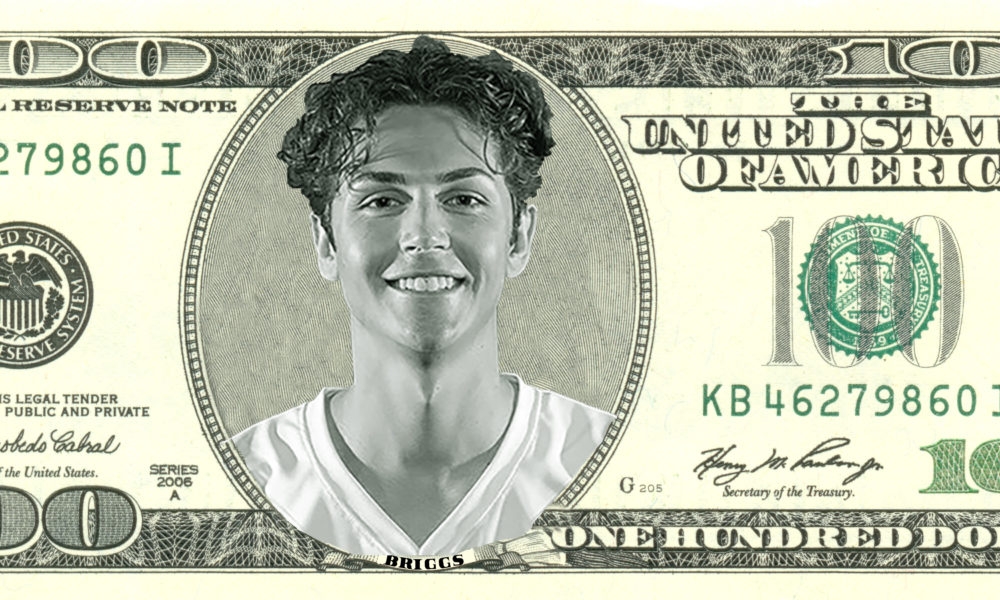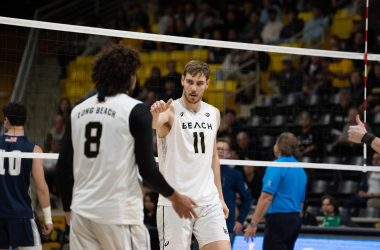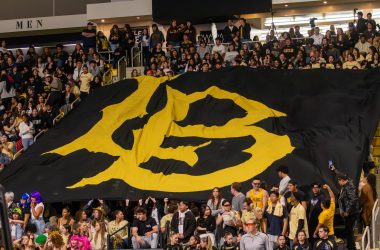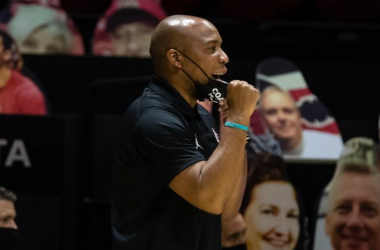By: Matthew Brown and Jeremy Taylor
Long Beach State’s men’s volleyball star Mason Briggs was enjoying his summer vacation on the east coast when he got a text from his dad that would impact the rest of his collegiate career.
His father sent him a link to a breaking news article about the NCAA having changed their name, image and likeness (NIL) rules, allowing college athletes to sign endorsement deals and earn compensation for the first time. When Briggs saw the news, he couldn’t believe it.
“My first thought was ‘No way this is finally happening, it’s not real,’” Briggs said. “Once it hit me that this was actually real, I began to think of ways I could make this work, not only for myself, but for the team.”
These new financial opportunities aren’t just for high-profile athletes like Alabama quarterback, Bryce Young, who has endorsements in the six figure range. Non-power five school athletes like Briggs are reaping the benefits of their student-athlete status.
Briggs has recently cashed in on endorsement deals with “NOEZBUCKETS” and “Crossnett.” Both are small, but growing businesses that see Briggs, the Big West Co-Freshman of the Year in 2020, as someone who can expand their brands to a younger audience.
For years, there have been countless debates on whether or not college athletes should get paid. Many argued that paying student-athletes would ruin the spirit of collegiate sports, and that the richest schools would get the best players, creating an unfair playing field.
But people who believed college athletes should be paid, pointed out the hypocrisy of college coaches getting paid millions, while the school also profits off of the athletes playing.
But this year, the U.S. Supreme Court decided that the NCAA violated antitrust law by limiting education-related benefits schools can provide to students.
With public pressure building amid the supreme court ruling, the NCAA changed their NIL rules on July 1, finally allowing players to earn compensation. However they have left it up to each state to decide their own rules and regulations regarding player endorsements.
California has always been progressive when it came to athletes earning endorsements. In 2019 they passed the California Fair Pay To Play Act, against the wishes of the NCAA at the time. The act essentially allowed players to earn compensation for their name, image and likeness.
The act was originally set to take effect in 2023, but after the NIL rule change this year, Gov. Gavin Newsom amended the act to be an urgency statute, bringing it into effect on Sept. 1. The act now extends to community college athletes as well.
Within hours of the rule change, hundreds of athletes were already signing endorsement deals and promoting themselves on social media. Briggs, however, erred on the side of caution.
“I didn’t want to jump into anything too quick,” Briggs said. “I didn’t really put myself out there, I wanted to wait and see how other athletes are going about it.”
Former Long Beach State volleyball player, Dustin Watten, reached out to Briggs to be an ambassador for Watten’s brand, “NOEZBUCKETS.” Watten started the company two years ago, and began creating products to help athletes with a big passion for the game and to sharpen their skills.
View this post on Instagram
Right now the company’s website offers video courses for volleyball athletes looking to improve their game—for both beginners or the more experienced player. Briggs’ ambassador role right now involves him recruiting younger players and growing the “NOEZBUCKETS” brand.
The plan is for Briggs to eventually start recording instructional videos for the website, analyzing submitted videos by players and providing feedback.
“I wanted to find a combination of the best upcoming liberos in the states and athletes who have already been putting in the intentional work on and off the court,” Watten said. “Mason’s clarity in his goals, the intention he lives with, the work he puts in and his sacrifice of activities that don’t align with his best self makes him a natural leader that guys can trust on and off the court.”
Briggs also has an endorsement deal with “Crossnett,” a mix between foursquare and volleyball.
Through “Crossnett,” Briggs promotes the game to younger kids and makes posts on social media. Briggs also filmed a tutorial video for the game that is going to be sent out to P.E. programs across schools that are interested.
“I want to be endorsed by brands that will benefit myself and the company as well,”’ Briggs said. “I see this as a partnership, I’m not just chasing money because just like with anything, that won’t turn out well in the end.”
View this post on Instagram
Rob Sweet, a sports agent at GreenSportsManagement, warns that college athletes looking to get endorsements should not just sign with the biggest agency or management group just because of their size.
Instead they should do their own research, talk with agents and build a relationship before signing a contract with them, he said.
“[Student athletes] are finally excited to get paid, but they are not actually educated on what is really going on or how to even read the contracts,” Sweet said. “With that lack of knowledge, a lot of people will take advantage of these kids.”
As of right now there is no governing body regulating contract talks, and schools are prohibited in negotiating the contract with the students. This essentially leaves athletes on their own to find an agency group or endorsement deal.
Even though CSULB is prohibited from giving input in contract negotiations, they are able to educate student-athletes on how the process works. The athletic department’s compliance office goes over everything an athlete needs to know before negotiating contracts and is there to answer any questions they may have.
“We are trying to educate the student athletes that they make good choices when it comes to their brand and reputation,” Athletic Director Andy Fee said. “You hope that people don’t prey on these athletes and take advantage of them because they’re younger and they may not be familiar with how the law system works and in terms of contracts.”




